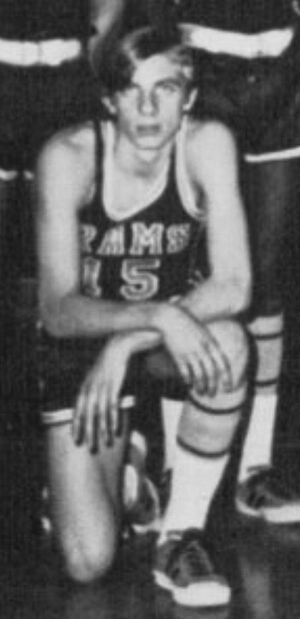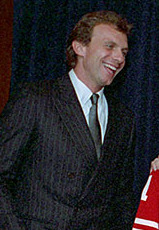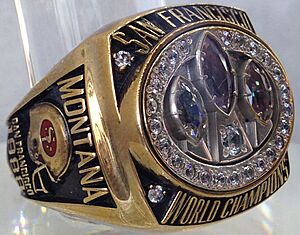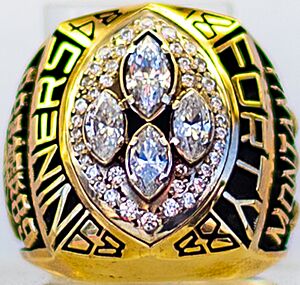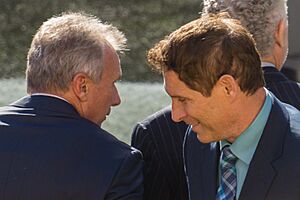Joe Montana facts for kids

Montana in 2016
|
|||||||||||||||||
| No. 16, 19 | |||||||||||||||||
|---|---|---|---|---|---|---|---|---|---|---|---|---|---|---|---|---|---|
| Position: | Quarterback | ||||||||||||||||
| Personal information | |||||||||||||||||
| Born: | June 11, 1956 New Eagle, Pennsylvania, U.S. |
||||||||||||||||
| Height: | 6 ft 2 in (1.88 m) | ||||||||||||||||
| Weight: | 200 lb (91 kg) | ||||||||||||||||
| Career information | |||||||||||||||||
| High school: | Ringgold (Carroll, Pennsylvania) |
||||||||||||||||
| College: | Notre Dame (1974–1978) | ||||||||||||||||
| NFL Draft: | 1979 / Round: 3 / Pick: 82 | ||||||||||||||||
| Career history | |||||||||||||||||
|
|||||||||||||||||
| Career highlights and awards | |||||||||||||||||
|
|||||||||||||||||
| Career NFL statistics | |||||||||||||||||
|
|||||||||||||||||
| Player stats at PFR | |||||||||||||||||
|
Pro Football Hall of Fame
|
|||||||||||||||||
Joseph Clifford Montana Jr. (born June 11, 1956) is a famous American former football quarterback. He played in the National Football League (NFL) for 16 seasons. Most of his career was with the San Francisco 49ers. People called him "Joe Cool" and "the Comeback Kid". Many consider Montana one of the greatest quarterbacks ever.
After winning a national championship with the Notre Dame Fighting Irish, Montana joined the NFL in 1979. He played for the 49ers for 14 seasons. With the 49ers, Montana led his team to win four Super Bowls. He was also the first player to win the Super Bowl Most Valuable Player (MVP) award three times. He holds Super Bowl records for most passes without an interception (122 in four games). His all-time highest passer rating in the Super Bowl is 127.8.
In 1993, Montana moved to the Kansas City Chiefs. He played his last two seasons there. He helped the Chiefs reach their first AFC Championship Game. In 2000, Montana was inducted into the Pro Football Hall of Fame.
In 1986, Montana won the NFL Comeback Player of the Year Award. This was after he had a serious back injury. He was named the NFL Most Valuable Player in 1989 and 1990. Montana was chosen for eight Pro Bowls. He was also a first-team All-Pro three times.
Some of his most famous plays include "the Catch". This was a game-winning touchdown pass in the 1981 NFC Championship. Another was a 92-yard drive in Super Bowl XXIII. This drive led to a Super Bowl win against the Cincinnati Bengals. These plays are often shown in NFL highlight films.
The 49ers retired Montana's No. 16 jersey after he stopped playing. He was also named to the NFL 75th Anniversary All-Time Team and the NFL 1980s All-Decade Team. In 1999, The Sporting News ranked him third among Football's 100 Greatest Players. Sports Illustrated called him the number-one clutch quarterback of all time in 2006.
Contents
Joe Montana's Early Life
Montana was born in New Eagle, Pennsylvania. This town is near Pittsburgh. He grew up in Monongahela, Pennsylvania, a coal mining town. His family was Italian-American.
Montana loved sports from a young age. His father taught him football. He started playing youth football at eight years old. His dad even said he was nine so he could play.
Besides football, Montana also liked baseball and basketball. Basketball was his favorite. His father started a local basketball team for him. They played in tournaments.
Montana went to Waverly Elementary and Finleyville Junior High. He then attended Ringgold High School. There, he played football, baseball, and basketball. He was a great basketball player. He helped Ringgold win a championship in 1973. He was even offered a basketball scholarship by North Carolina State. He thought about it because he could play both sports there.
Montana was a backup quarterback for his first two years in high school. As a junior, he became the starting quarterback for the Ringgold Rams. He kept this role for his last two years. After his senior year, Parade named him to their All-American team.
His junior year performance caught the eye of college recruiters. Especially those from Notre Dame. Notre Dame offered him a scholarship, and he accepted. One reason he chose Notre Dame was because his idol, Terry Hanratty, went there.
In 2006, Ringgold High School renamed their football stadium "Joe Montana Stadium".
College Football Career
Starting at Notre Dame
Montana joined Notre Dame in 1974. The football team was coached by Ara Parseghian. Freshmen were not allowed to play on the main team then. So, Montana only played in a few junior varsity games. He started making a big impact in his second year.
In December 1974, Parseghian resigned. Dan Devine became the new coach. Montana did well in spring practice in 1975. Coach Devine was very impressed. He even told his wife, "He's the guy who's going to feed our family for the next few years."
Amazing Comebacks
Montana was not the full-time starter in 1975. But he helped Notre Dame win against North Carolina. He came in late in the game. North Carolina was leading 14–6. Montana threw for 129 yards, and Notre Dame won 21–14.
In the next game against Air Force, Montana came in during the fourth quarter. Air Force was ahead 30–10. But Notre Dame won 31–30. These games showed Montana's ability to perform well under pressure. This skill became very important throughout his career.
Winning a National Title
In 1976, Montana hurt his shoulder and could not play. He got an extra year of eligibility because of this.
When the 1977 season began, Montana was the third-string quarterback. He did not play in the first two games. In the third game against Purdue, the starting quarterback got injured. Montana finally got to play. Purdue was leading 24–14. Montana threw for 154 yards and a touchdown. Notre Dame won 31–24.
After that game, Montana became the starting quarterback. The team won their next nine games. They beat top-ranked Texas 38–10 in the Cotton Bowl. Notre Dame finished with an 11–1 record. They won the national title that year.
The "Chicken Soup Game"
In 1978, Montana led Notre Dame to another comeback win against the Pitt Panthers. He almost did it again against USC, their main rival.
On January 1, 1979, Notre Dame played Houston in the Cotton Bowl. It was very cold. Montana got hypothermia in the second quarter. His body temperature dropped. At halftime, Houston was up 20–12. Montana stayed in the locker room. Doctors gave him warm fluids and chicken soup.
Montana returned in the third quarter. Houston was leading 34–12. Montana led the Irish to three touchdowns in the last eight minutes. The final touchdown came as time ran out. Notre Dame won 35–34. This game became known as the "Chicken Soup Game".
Joining the NFL
Montana graduated from Notre Dame with a degree in business. Even though he was great in college, many NFL scouts did not rate him highly. They thought his arm strength was only average.
In the 1979 NFL draft, the San Francisco 49ers picked Montana. He was the 82nd player chosen. He was the fourth quarterback picked in that draft.
Professional Football Career
San Francisco 49ers: Early Years
Montana played in all 16 games in his first season (1979). But he only threw 23 passes. He was mostly a backup. He became the starting quarterback in the middle of the 1980 season.
On December 7, 1980, San Francisco played the New Orleans Saints. The Saints were winning 35–7 at halftime. The 49ers tied the game by the end of regular time. In overtime, San Francisco won 38–35. This was Montana's first fourth-quarter comeback win in the NFL. He would have 31 such wins in his career.
The 49ers finished 1980 with a 6–10 record. Montana threw for 1,795 yards and 15 touchdowns. He completed 64.5 percent of his passes, which was the best in the league.
The Catch and Super Bowl Wins
Montana started the 1981 season as the main quarterback. The team had a great season, finishing 13–3. Montana helped them win two games with fourth-quarter comebacks.
On January 10, 1982, San Francisco played the Dallas Cowboys in the NFC Championship Game. Dallas was leading 27–21 with less than five minutes left. The 49ers started their drive from their own 11-yard line. Montana led them down the field. With 51 seconds left, he threw an off-balance pass to Dwight Clark. Clark made a leaping catch for the game-tying touchdown. The 49ers won 28–27. This play is simply known as The Catch. It sent the 49ers to Super Bowl XVI.
San Francisco faced the Cincinnati Bengals in Super Bowl XVI. Montana completed 14 of 22 passes for 157 yards. He had one passing touchdown and one rushing touchdown. The 49ers won 26–21. Montana was named the Super Bowl Most Valuable Player Award. He would win this award two more times.
The 1982 season was shorter due to a player strike. Montana threw for 2,613 yards and 17 touchdowns. He set an NFL record with five straight 300-yard passing games.
In 1983, Montana threw for 3,910 yards and 26 touchdowns. The team made the playoffs. In the divisional game, they beat the Detroit Lions with a late touchdown pass from Montana. They then lost a close NFC Championship game to the Washington Redskins, 24–21.
Dominating the NFL in 1984
The 49ers had an amazing 1984 season. They finished with a 15–1 record. This was the first time a team won 15 games in a regular season. Montana had another excellent year and went to the Pro Bowl.
In Super Bowl XIX, the 49ers played the Miami Dolphins and their quarterback, Dan Marino. Montana threw for three touchdowns. He completed 24 of 35 passes for a Super Bowl record 331 yards. He also rushed for 59 yards. The 49ers won 38–16. Montana earned his second Super Bowl MVP award. Coach Bill Walsh called Montana the "greatest quarterback today, maybe the greatest quarterback of all time."
Injuries and More Success
In 1985, the 49ers made the playoffs again. But they lost in the Wild Card game.
Montana suffered a serious back injury in the first week of the 1986 season. He needed surgery. Doctors even suggested he retire. But Montana returned to play later that year. He threw for 270 yards and three touchdowns in his first game back. He won the 1986 NFL Comeback Player of the Year Award.
In 1987, Montana threw a career-high 31 touchdown passes in just 13 games. He also set an NFL record for most consecutive pass attempts without an incomplete pass (22). The 49ers had the best record in the NFL. However, they lost in the playoffs to the Minnesota Vikings. Before this season, the 49ers traded for Steve Young, another talented quarterback.
Super Bowl XXIII and XXIV
By the 1988 season, there was talk about who should be the starting quarterback, Montana or Young. Montana played most of the time. After a tough start, Montana led the 49ers to a 10–6 record. They won their division.
The 49ers reached Super Bowl XXIII. They beat the Minnesota Vikings and the Chicago Bears in the playoffs. In the NFC Championship game against the Bears, Montana threw for 288 yards and 3 touchdowns in very cold weather. The 49ers won 28–3.
In January 1989, the 49ers faced the Cincinnati Bengals again in the Super Bowl. Montana had one of his best games. He completed 23 of 36 passes for a Super Bowl record 357 yards and two touchdowns. The 49ers were down 16–13 with only 3:20 left. Montana led a 92-yard drive. He threw the game-winning touchdown pass with just 34 seconds left.
The 1989 season was great for Montana and the 49ers. They had the best record in the NFL at 14–2. Montana threw for 3,521 yards and 26 touchdowns with only 8 interceptions. He won the NFL Most Valuable Player Award. The 49ers easily won their playoff games.
In Super Bowl XXIV, Montana became the first player to win Super Bowl MVP three times. He threw for 297 yards and a Super Bowl record five touchdowns. The 49ers defeated the Denver Broncos 55–10. This was the most lopsided score in Super Bowl history.
Final Years with 49ers
In 1990, Montana again led the 49ers to a 14–2 record. Sports Illustrated named him Sportsman of the Year. He threw for a career-best 476 yards and six touchdowns in one game. He finished the season with 3,944 yards and 26 touchdowns.
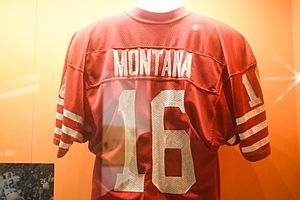
The 49ers hoped to win three Super Bowls in a row. They reached the NFC Championship Game against the New York Giants. Montana was injured during the game and had to leave. The Giants won 15–13.
Montana missed all of the 1991 season and most of 1992 due to an elbow injury. When he returned for one game in 1992, Steve Young had become the main quarterback. Montana did not play another snap for the 49ers.
There was a debate about who should be the starting quarterback. Steve Young had played very well. Montana decided to ask for a trade. Young later led the team to another Super Bowl win.
Kansas City Chiefs
Montana was traded to the Kansas City Chiefs on April 20, 1993. He signed a $10 million contract. His arrival, along with running back Marcus Allen, created a lot of excitement. Montana chose to wear number 19.
Montana was injured for part of the 1993 season. But he was still chosen for his last Pro Bowl. The Chiefs won their division for the first time in 22 years. Montana led the Chiefs to two comeback wins in the playoffs. They reached the AFC Championship Game. They lost to the Buffalo Bills 30–13. Montana suffered a concussion in that game.
Montana returned healthy in 1994. He played against his old team, the San Francisco 49ers, and Steve Young. Montana and the Chiefs won 24–17. He led his team to a 9–7 record and another playoff spot. They lost to the Miami Dolphins in the Wild Card round.
Montana loved playing at Arrowhead Stadium in Kansas City. He remembered the "unbelievable roar" from the fans. He said the fan base was "one of the best in the NFL."
Retirement
On April 18, 1995, Montana announced his retirement. The event was in San Francisco. Many famous people, including John Madden and Bill Walsh, spoke. Highlights from his career were shown.
After football, Montana became a venture capitalist. He co-founded a firm called Liquid 2 Ventures in 2015.
Joe Montana's NFL Records and Achievements
Montana was known for staying calm under pressure. He led his teams to 32 fourth-quarter comeback victories. "The Catch" in 1981 and the 92-yard drive in Super Bowl XXIII are famous examples.
With the 49ers, Montana completed 2,929 passes for 35,142 yards. He threw 244 touchdowns and 123 interceptions. He had 35 games with over 300 passing yards. Seven of those games had over 400 yards.
His career totals include 3,409 completions, 40,551 passing yards, 273 touchdowns, and 139 interceptions. He also rushed for 1,676 yards and 20 touchdowns. When he retired, his career passer rating was 92.3. His record as a starting quarterback was 117 wins and 47 losses. The 49ers retired his number 16 jersey on December 15, 1997.
Montana holds several postseason records. He is second in career postseason touchdown passes (45) and passing yards (5,772). He is undefeated in four Super Bowl appearances. He completed 83 of 122 passes for 1,142 yards, 11 touchdowns, and no interceptions in Super Bowls. His Super Bowl passer rating is 127.8. He was the first player to win three Super Bowl MVP awards. He also holds the Super Bowl record for most pass attempts (122) without an interception.
He was selected to the Pro Bowl eight times. He was chosen as All-Pro six times. He is also the only player with two touchdown passes of 95+ yards.
The NFL Network ranked Montana #4 on their list of The Top 100: NFL's Greatest Players. He was the highest-ranked quarterback on that list.
Joe Montana's Nicknames
Montana earned the nickname "Joe Cool" because he stayed calm in important moments. He was also called "the Comeback Kid" for his many late-game rallies. His teammates called him "Bird Legs" because his legs were thin. He was also known as "Golden Joe" because he played in California, the "Golden State."
Personal Life
Montana is married to Jennifer Wallace. They met while working on a commercial. They married in 1985. They have four children, two daughters and two sons. His son Nate played college football. His other son, Nick, also played college football.
Montana lives in San Francisco. He owns horses and makes wine under the name Montagia. He often works with the Make-A-Wish Foundation.
See also
 In Spanish: Joe Montana para niños
In Spanish: Joe Montana para niños
- Bay Area Sports Hall of Fame
- History of Kansas City Chiefs quarterbacks
- List of NFL quarterbacks who have posted a perfect passer rating
- List of quarterbacks with multiple Super Bowl wins
- List of celebrities who own wineries and vineyards


